Wesleyan University announces Embodying Antiracism Initiative Fellows
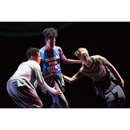
Urban Bush Women
The Embodying Antiracism Initiative is being designed in collaboration with support from three organizational partners—Urban Bush Women, Junebug Productions, and The People’s Institute for Survival and Beyond—whose innovative work actively engages in the practice of both unmasking and undoing racism. Image: Urban Bush Women rehearse the Connecticut premiere of their work "Walking with ’Trane" in the Center for the Arts Theater at Wesleyan University in March 2017. Photo by Sandy Aldieri of Perceptions Photography.
Click here to download high resolution version.
The Embodying Antiracism Initiative is being designed in collaboration with support from three organizational partners—Urban Bush Women, Junebug Productions, and The People’s Institute for Survival and Beyond—whose innovative work actively engages in the practice of both unmasking and undoing racism. Image: Urban Bush Women rehearse the Connecticut premiere of their work "Walking with ’Trane" in the Center for the Arts Theater at Wesleyan University in March 2017. Photo by Sandy Aldieri of Perceptions Photography.
Click here to download high resolution version.
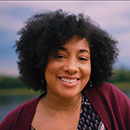
Sacha Armstrong-Crockett, Community Fellow
“I'm excited about the possibility of sustainable community outreach and youth development in Middletown,” said Armstrong-Crockett. “I hope we can create an opportunity rich space and programming that encourages, empowers, and expands Black creative expression. If that can be done in an effective and authentic way, my next hope is that it would lead to a unified effort to build local political power.”
Click here to download high resolution version.
“I'm excited about the possibility of sustainable community outreach and youth development in Middletown,” said Armstrong-Crockett. “I hope we can create an opportunity rich space and programming that encourages, empowers, and expands Black creative expression. If that can be done in an effective and authentic way, my next hope is that it would lead to a unified effort to build local political power.”
Click here to download high resolution version.

Kerry Kincy, Community Fellow
“I am most fascinated by the effects of systematic inequality formed by race in individuals and collectively in communities,” said Kincy. “Art is paramount in generating deeper connections to self and an awareness for the experiences of others. Art affords equitable power sharing.”
Click here to download high resolution version.
“I am most fascinated by the effects of systematic inequality formed by race in individuals and collectively in communities,” said Kincy. “Art is paramount in generating deeper connections to self and an awareness for the experiences of others. Art affords equitable power sharing.”
Click here to download high resolution version.

Barbara McClane, Community Fellow
“Joining this cohort excites me as I see opportunities to engage with others in building a better understanding of our communities and how art can heal,” said McClane.
Click here to download high resolution version.
“Joining this cohort excites me as I see opportunities to engage with others in building a better understanding of our communities and how art can heal,” said McClane.
Click here to download high resolution version.
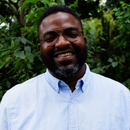
Karl Boulware, Faculty Fellow
"I was motivated to apply to the fellowship after gradually realizing my research and teaching interests had begun to align with my personal interest in U.S. racial inequality and the collaboration with others,” said Boulware. “I would define my current research agenda as an investigation of the macroeconomic aspects of racial inequality through the lens of macroeconomic policy."
Click here to download high resolution version.
"I was motivated to apply to the fellowship after gradually realizing my research and teaching interests had begun to align with my personal interest in U.S. racial inequality and the collaboration with others,” said Boulware. “I would define my current research agenda as an investigation of the macroeconomic aspects of racial inequality through the lens of macroeconomic policy."
Click here to download high resolution version.

Maria-Christina Oliveras, Faculty Fellow
"I want to surround myself with thinkers and educators who are devoted to building equity on stage, in the classroom, the rehearsal room, and the world at large, and to devote time to understanding, on deeper levels, critical race theory, and anti-racist pedagogy,” said Oliveras. “My research during the fellowship will be centered around code shifting, micro-aggressions in pre-dominantly white worlds, and the conversation between classical forms of theater and pedagogy and the contemporary world.” Image by Lia Chang.
Click here to download high resolution version.
"I want to surround myself with thinkers and educators who are devoted to building equity on stage, in the classroom, the rehearsal room, and the world at large, and to devote time to understanding, on deeper levels, critical race theory, and anti-racist pedagogy,” said Oliveras. “My research during the fellowship will be centered around code shifting, micro-aggressions in pre-dominantly white worlds, and the conversation between classical forms of theater and pedagogy and the contemporary world.” Image by Lia Chang.
Click here to download high resolution version.
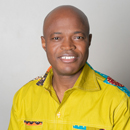
Iddi Saaka, Faculty Fellow
“I use my movement backgrounds to make work that questions status quo, unsettles the normal, [and] sheds light on socio-political issues of interest with the hope that my work contributes towards making society more equitable,” said Saaka. “This fellowship will allow me…to probe issues of race, place, belonging and skin color…how does one’s place of origin, skin color, and gender open and/or close doors of opportunity to pursue personal ambitions, dreams, and a decent livelihood?”
Click here to download high resolution version.
“I use my movement backgrounds to make work that questions status quo, unsettles the normal, [and] sheds light on socio-political issues of interest with the hope that my work contributes towards making society more equitable,” said Saaka. “This fellowship will allow me…to probe issues of race, place, belonging and skin color…how does one’s place of origin, skin color, and gender open and/or close doors of opportunity to pursue personal ambitions, dreams, and a decent livelihood?”
Click here to download high resolution version.
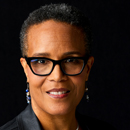
Tracy Heather Strain, Faculty Fellow
"I want to move my filmmaking in new directions,” said Strain. “Finding a broad community of storytellers and thinkers committed to antiracism and civic engagement is something I’ve craved since 1999, when I ended my tenure at Blackside after the death of its founder Henry Hampton in 1998." Photo by Joel Benjamin.
Click here to download high resolution version.
"I want to move my filmmaking in new directions,” said Strain. “Finding a broad community of storytellers and thinkers committed to antiracism and civic engagement is something I’ve craved since 1999, when I ended my tenure at Blackside after the death of its founder Henry Hampton in 1998." Photo by Joel Benjamin.
Click here to download high resolution version.

Ryan Dobrin, Visiting Guest Artist Fellow
“I am often engaged in conversations about anti-racism, but specifically in the theater and in theater-centric concepts,” said Dobrin. “My hope is that these conversations and projects can spark changes…I am thrilled to return to my alma mater to engage in expanding anti-racist practices in academia through an artistic lens.”
Click here to download high resolution version.
“I am often engaged in conversations about anti-racism, but specifically in the theater and in theater-centric concepts,” said Dobrin. “My hope is that these conversations and projects can spark changes…I am thrilled to return to my alma mater to engage in expanding anti-racist practices in academia through an artistic lens.”
Click here to download high resolution version.

Jerome Haferd, Visiting Guest Artist Fellow
“Justice and Equity permeate my work,” said Haferd. “As a Black, mixed race, and LGBTQ+, I seek the transformation of design practice through the lens of Land, Blackness, Indigeneity, and other historically marginalized subjects and modes of cultural and spatial production. I am excited about this opportunity - we rarely are offered a container that is both inward focused on us and our work, and also looking outward.”
Click here to download high resolution version.
“Justice and Equity permeate my work,” said Haferd. “As a Black, mixed race, and LGBTQ+, I seek the transformation of design practice through the lens of Land, Blackness, Indigeneity, and other historically marginalized subjects and modes of cultural and spatial production. I am excited about this opportunity - we rarely are offered a container that is both inward focused on us and our work, and also looking outward.”
Click here to download high resolution version.

nia love, Visiting Guest Artist Fellow
“I believe that this interdisciplinary residency at Wesleyan is a way to nourish the soul of an ‘art work,’” said love. “Conversation itself has been an integral part of my practice…so I am curious about interdisciplinarity as a way to re-define what we are doing within our disciplines, honoring their specificities while also questioning their boundaries…I am interested in fomenting a new way, elsewhere and in other ways finding a center to our relationships that in turn displace violence, heteropatriarchy, colonialism, and capitalism.” Photo by Tony Turner.
Click here to download high resolution version.
“I believe that this interdisciplinary residency at Wesleyan is a way to nourish the soul of an ‘art work,’” said love. “Conversation itself has been an integral part of my practice…so I am curious about interdisciplinarity as a way to re-define what we are doing within our disciplines, honoring their specificities while also questioning their boundaries…I am interested in fomenting a new way, elsewhere and in other ways finding a center to our relationships that in turn displace violence, heteropatriarchy, colonialism, and capitalism.” Photo by Tony Turner.
Click here to download high resolution version.
“The Embodying Antiracism Initiative supports the deep work of fostering an equitable and antiracist community. The project provides resources to faculty, community members, guest artists/scholars, and students doing the often-unseen antiracist organizing labor,” said Jennifer Calienes, Interim Director of the Center for the Arts.
The Embodying Antiracism Initiative was conceived by Provost Nicole Stanton, and was developed in consultation with Calienes and others across the University. The initiative is being designed in collaboration with three organizational partners—Urban Bush Women, Junebug Productions, and The People’s Institute for Survival and Beyond—whose innovative work actively engages in the practice of both unmasking and undoing racism.
"To embody antiracism is to develop muscle memory so that the antiracist principles that we write and talk about are embedded in every aspect of our daily experiences,” said Stephanie McKee-Anderson, executive artistic director of Junebug Productions.
The fellowship recipients either applied for or were nominated based on their demonstrated interest in and commitment to the study and practice of undoing racism. The Fellows will make up the Think Tank, and were selected by the Wesleyan Embodying Antiracism Organizing Team which is comprised of staff and faculty representatives from Academic Affairs; the Center for the Arts; the Jewett Center for Community Partnerships, a program of the Albritton Center for the Study of Public Life; and the Resource Center, a student facing program of the Office for Equity and Inclusion.
“Through this remarkable interdisciplinary cohort and in close collaboration with our partners, we have the opportunity to align our existing efforts, provide much-needed peer support, and cultivate new platforms for leadership training that nourish our campus as an antiracist environment,” said Stanton, provost and senior vice president for Academic Affairs, and professor of Dance, Environmental Studies, and African American Studies. “This project brings together faculty from Film, Economics, Dance, and Theater, community organizers working on housing discrimination, equitable access to arts experiences, and antiracism in the Middletown community, and guest artists who work in the realms of architecture and performance and their intersection with black liberation. Our Embodying Antiracism Think Tank will give these extraordinary individuals a place and a form for collaboration, study, and action.”
Fellows will be provided with resources and support to pursue or continue an original project or research, engage and collaborate with other fellows, and disseminate their work from the Think Tank. Wesleyan faculty will receive teaching relief, a stipend, research funding, and support for pedagogical innovations in the study of racism and antiracism, as well as the opportunity to participate in workshops led by the three organizational partners.
In March 2023, all Fellows will participate in a culminating Leadership Intensive that is designed to highlight their research, change campus community culture, and innovate research practices through the arts. The Leadership Intensive will be designed and facilitated in partnership with Urban Bush Women, The People’s Institute for Survival and Beyond, and Junebug Productions.
The Embodying Antiracism Initiative at Wesleyan is made possible with support from The Andrew W. Mellon Foundation.
About the Fellows
Community Fellows
Sacha Armstrong-Crockett, a realtor from Middletown where she is the Co-Chair for the Mayor’s Anti-Racism Task Force. Armstrong-Crockett is involved in educating BIPOC (Black, Indigenous, People of Color) folks on the importance of homeownership. She puts an emphasis on the history of the government's role in federally mandated segregation, redlining and Black land loss. DeSegregate Connecticut featured her in their educational videos where she speaks on how racist zoning policies of yesterday still affect Black homeownership rates today, and her TEDx talk speaks to “Black Healing in White Spaces.” “I'm excited about the possibility of sustainable community outreach and youth development in Middletown,” said Armstrong-Crockett. “I hope we can create an opportunity rich space and programming that encourages, empowers, and expands Black creative expression. If that can be done in an effective and authentic way, my next hope is that it would lead to a unified effort to build local political power.”
Kerry Kincy, an artist and community consultant from Middletown who serves as the Director of the Free Center’s art and wellness programming. She is also the director of the New Haven Ballet’s Shared Abilities Dance Ensemble, and has lectured in the Dance Department at Wesleyan University. “I am most fascinated by the effects of systematic inequality formed by race in individuals and collectively in communities,” said Kincy. “Art is paramount in generating deeper connections to self and an awareness for the experiences of others. Art affords equitable power sharing.”
Barbara McClane, a professional photographer and project manager from Cromwell whose recent projects have focused on highlighting members of her local LGBTQ+ community and people of color. She is also working on a memoir, “Blessed, Not Bitter,” which details her personal journey from surviving addiction to reconnecting with her biological family and inspiring others to find the joy and hope in life. “Joining this cohort excites me as I see opportunities to engage with others in building a better understanding of our communities and how art can heal,” said McClane.
Faculty Fellows
Karl Boulware, Assistant Professor of Economics, whose recent research addresses topics such as racial wealth stratification and the frequency of discrimination charges over the business cycle. Prior to Wesleyan, he completed his Ph.D. at the University of Alabama’s Culverhouse College of Business in 2014. "I was motivated to apply to the fellowship after gradually realizing my research and teaching interests had begun to align with my personal interest in U.S. racial inequality and the collaboration with others,” said Boulware. “I would define my current research agenda as an investigation of the macroeconomic aspects of racial inequality through the lens of macroeconomic policy."
Maria-Christina Oliveras, Assistant Professor of Theater, an actor, singer, writer, educator, and producer. A first-generation Filipina Puerto Rican from the Bronx, New York who is dedicated to new works and underrepresented stories, Oliveras originated the role of Gina in "Amelie," and also appeared in "Machinal" and "Bloody Bloody Andrew Jackson" on Broadway, as well as sang with Taylor Mac and Toshi Reagon. "I want to surround myself with thinkers and educators who are devoted to building equity on stage, in the classroom, the rehearsal room, and the world at large, and to devote time to understanding, on deeper levels, critical race theory, and anti-racist pedagogy,” said Oliveras. “My research during the fellowship will be centered around code shifting, micro-aggressions in pre-dominantly white worlds, and the conversation between classical forms of theater and pedagogy and the contemporary world.”
Iddi Saaka, Assistant Professor of Dance, a West African dance and music performance artist and teacher who specializes in Ghanaian dance and music as well as contemporary dance. He holds a Diploma (with distinction) from the University of Ghana and an M.F.A. in Dance from the University of California, Los Angeles. “I use my movement backgrounds to make work that questions status quo, unsettles the normal, [and] sheds light on socio-political issues of interest with the hope that my work contributes towards making society more equitable,” said Saaka. “This fellowship will allow me…to probe issues of race, place, belonging and skin color…how does one’s place of origin, skin color, and gender open and/or close doors of opportunity to pursue personal ambitions, dreams, and a decent livelihood?”
Tracy Heather Strain, Chair and Corwin-Fuller Professor of Film Studies, and Co-Director of the Wesleyan Documentary Project, a two-time Peabody Award-winning and Emmy-nominated filmmaker who explores stories about the ways diverse peoples have experienced life in the United States. Strain is a 2022 recipient of the Chicken and Egg Award, a recognition bestowed on advanced-career women and gender nonconforming filmmakers. In 2019 she won an NAACP Image Award for Motion Picture Directing for “Lorraine Hansberry: Sighted Eyes/Feeling Heart,” which premiered at the 2017 Toronto International Film Festival and aired on "American Masters." "I want to move my filmmaking in new directions,” said Strain. “Finding a broad community of storytellers and thinkers committed to antiracism and civic engagement is something I’ve craved since 1999, when I ended my tenure at Blackside after the death of its founder Henry Hampton in 1998."
Visiting Guest Artist Fellows
Ryan Dobrin ’18, a queer, biracial New York-based director, producer, and theater maker interested in highly-stylized storytelling, ethical implications, the existence of magic and spectacle, and narratives with a strong, beating heart. “I am often engaged in conversations about anti-racism, but specifically in the theater and in theater-centric concepts,” said Dobrin. “My hope is that these conversations and projects can spark changes…I am thrilled to return to my alma mater to engage in expanding anti-racist practices in academia through an artistic lens.”
Jerome Haferd, an architect, public artist, activist, and educator based in Harlem, New York. He is co-founder of the award-winning design and research practice BRANDT : HAFERD, and a core initiator of Dark Matter University, an inter-disciplinary BIPOC-led design network transforming the space of practice and knowledge production. He currently teaches at City College’s Bernard and Anne Spitzer School of Architecture, Columbia’s Graduate School of Architecture, Planning and Preservation, and the Yale School of Architecture. “Justice and Equity permeate my work,” said Haferd. “As a Black, mixed race, and LGBTQ+, I seek the transformation of design practice through the lens of Land, Blackness, Indigeneity, and other historically marginalized subjects and modes of cultural and spatial production. I am excited about this opportunity - we rarely are offered a container that is both inward focused on us and our work, and also looking outward.”
nia love, a Black, indigenous, American woman, dancer, choreographer, diver, and mother, whose practice is anchored and immersed in maternal care, alchemy of blackness, embodied memory, and curiosity with the sea. “I believe that this interdisciplinary residency at Wesleyan is a way to nourish the soul of an ‘art work,’” said love. “Conversation itself has been an integral part of my practice…so I am curious about interdisciplinarity as a way to re-define what we are doing within our disciplines, honoring their specificities while also questioning their boundaries…I am interested in fomenting a new way, elsewhere and in other ways finding a center to our relationships that in turn displace violence, heteropatriarchy, colonialism, and capitalism.”
About the Embodying Antiracism Think Tank
The members of the Embodying Antiracism Think Tank will undertake the initiative’s research and collaborative work with each other and the organizational partners for the fellowship. The research component of the Think Tank is expected to generate a wide range of art, publications, and events—performances, films, scholarly papers, land-based projects, and/or an antiracism collective. The work of the Think Tank will be collected and disseminated in an open-access digital site and work will be highlighted through various University and community partners and platforms. Research seminars at the Think Tank will borrow methods from Wesleyan’s Center for the Humanities and College of the Environment, where a locus of faculty, fellows, and students can work on collaborative projects that address specific problems, share research and innovative curricular ideas, advance scholarship, and produce material outcomes.
For more information about the Embodying Antiracism Initiative at Wesleyan University, please visit https://www.wesleyan.edu/embodyingantiracism.